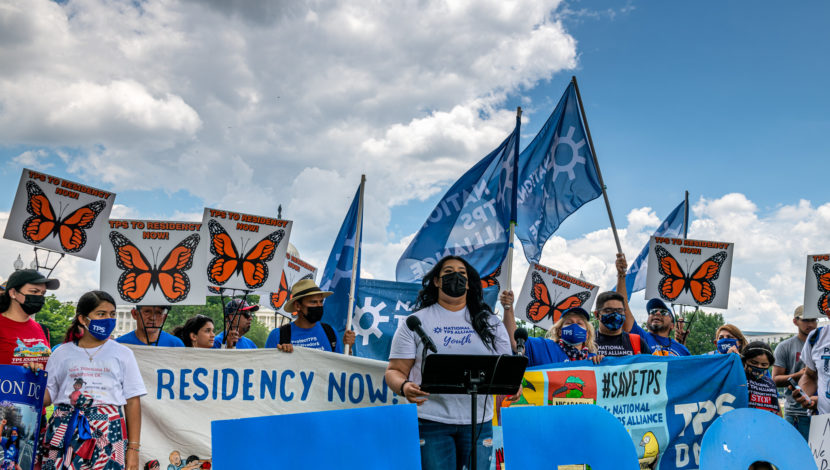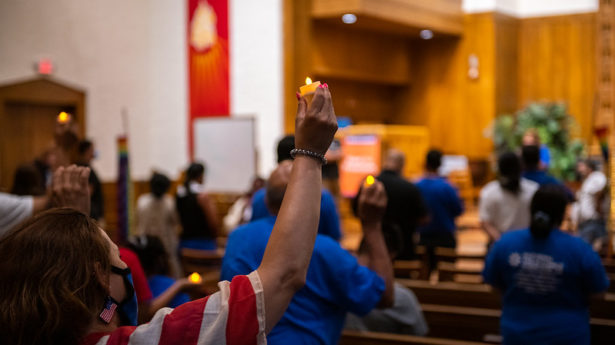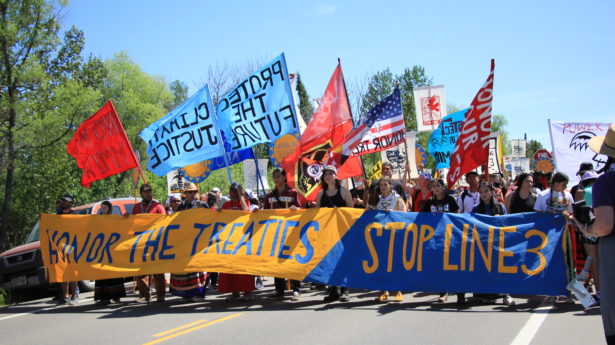The Unitarian Universalist Service Committee advances human rights through grassroots collaborations.
Congress Has a Once-in-a-Generation Chance to Protect Millions of Immigrants

By on July 26, 2021
Congresspeople are looking at the best chance they’ve had in years to enact a path to citizenship for millions of undocumented immigrants and people with temporary status. With recent legal setbacks to the Deferred Action for Childhood Arrivals (DACA) program, the need for Congress to take this step has only become more urgent. The time is therefore ripe, and Congress has the means to ensure permanent status for millions of people currently at risk of deportation and exclusion.
The obscure parliamentary procedure that would allow Congress to achieve this—known as budget reconciliation—has been likened to a “Hail Mary pass,” but this makes it sound as if our elected leaders had no choice but to lob their legislative proposal into the heavens and hope for the best. In reality, they hold the power to determine the outcome. If they fail to enact these life-saving provisions now, it will not be due to any forces of nature, but to a lack of political will. Voters will know this, too, and hold them to account at the ballot box.
Why should Congress seize this opportunity before it is too late?
The moral and practical imperative for immigration legislation is clear. Across the United States, millions of immigrants have been at heightened risk during the pandemic, working in frontline professions during the COVID-19 public health crisis. Many are denied official status, or work under forms of temporary protection that could be taken away. In short, the pandemic has underlined a fact that has been true for decades: U.S. society benefits from the sweat and sacrifice of immigrant people; yet it denies them the official recognition they need to defend their rights in the workplace and achieve full and equal citizenship.
This is wrong. And it can change. Congress can and should enact a pathway to citizenship for farm workers and other essential workers, Temporary Protected Status (TPS) and DACA holders, and millions of other immigrants now.
How can they make it happen?
Despite enjoying broad public support, immigration legislation faces an uphill battle in Congress. Current Senate rules require a supermajority of 60 votes for most bills to pass. As a result, even bills that have the support of most members of Congress still frequently fail to become law. For example, the House of Representatives has twice approved legislation that would create a path to citizenship for immigrants with DACA, TPS, and a similar temporary status program known as Deferred Enforced Departure (DED)—only to see the Senate fail to take up this popular legislation or get it across the finish line.
There is one exception, however, where the Senate’s usual supermajority requirement does not apply. A process known as “budget reconciliation” allows Congress to approve certain matters that have budgetary implications with only a simple majority. As senators announced a $3.5 trillion budget plan on July 14, they indicated it would include a path to citizenship for some groups of immigrants, and that they will attempt to enact this far-ranging legislative package through the reconciliation procedure.
In the days since, many have asked whether the Senate parliamentarian—who advises on whether or not specific provisions have sufficient budgetary importance to be enacted through reconciliation—would approve the inclusion of these measures. In reality, however, the Senate is a self-governed body, and the majority of senators or the presiding officer (Vice President Harris) could override the parliamentarian’s advice, should they choose to do so. If Congress fails to approve these measures through reconciliation, therefore, it will not be because they had no other option. It will instead reflect insufficient commitment on the part of senators and the party in power to deliver on their promises to immigrant communities and the millions of U.S. people of all backgrounds and statuses who support a path to citizenship.
How can we help?
If Congress is going to finally make good on their promises and protect millions of people from deportation and family separation, they need to support a path to citizenship through budget reconciliation. In order to achieve this in an evenly-divided senate, every single member of the chamber needs to hear from their constituents that we support immigrant communities and a path to citizenship for immigrant essential workers and others. UUSC has created a digital action that enables you to contact your senators directly. You can personalize your message before sending to make sure it speaks to the track record and concerns of your senators in office.
UUSC’s partners, including the UndocuBlack Network (UBN) and the National TPS Alliance, have been fighting for years for a path to citizenship for immigrant communities. Both have been central to shaping the proposals currently under consideration for inclusion and passage in budget reconciliation. Both are repeating the call now for Congress to finally make good on these promises. As UBN wrote in a recent statement, “Our community can not withstand any further hesitation or straddling the fence where our lives are concerned.” National TPS Alliance spokesperson Veronica Lagunas similarly asks: Are members of Congress “willing to stand with our migrant families until we get this done?”
We can be a part of finally getting this done. Millions of lives and futures depend on the outcome. This is the year; this is the moment, to at long last deliver for immigrant communities. Urge your senator to support a path to citizenship today.
***
About UUSC: Guided by the belief that all people have inherent worth and dignity, UUSC advances human rights globally by partnering with affected communities who are confronting injustice, mobilizing to challenge oppressive systems, and inspiring and sustaining spiritually grounded activism for justice. We invite you to join us in this journey toward realizing a better future!
Image Credit: Ash Ponders for UUSC

